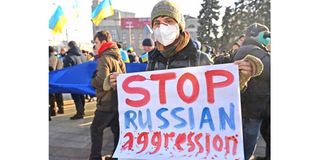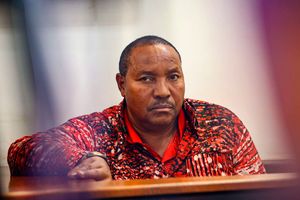UN: Pregnant women bearing the brunt of Ukraine war

A protester holds a placard during a Unity March in Kharkiv, eastern Ukraine, on February 5, 2022.UNFPA says Russia attacks are worsening vulnerabilities of women and girls in a country where gender-based violence has been a serious problem.
What you need to know:
- UNFPA, tasked with promoting the right to a healthy life and equal opportunity, estimates that 80,000 women will give birth in the next three months in Ukraine but have no access to critical maternal care.
- The UN agency said childbirth for many pregnant women will be life-threatening rather than life-changing as the raging war means they will lack the requisite services.
The ongoing Russian attacks on Ukraine are worsening vulnerabilities of women and girls in a country where gender-based violence has been a serious problem.
The United Nations Population Fund (UNFPA), in a statement, estimated that 80,000 women will give birth in the next three months in Ukraine, but many of them have no access to critical maternal care.
The UN agency, tasked with promoting the right of every individual to a healthy life and equal opportunity, said childbirth for many pregnant women will be life-threatening rather than life-changing as the raging war means they will lack the requisite services.
“Since Russia launched a military offensive in Ukraine, the world has seen the photographs of women giving birth in underground metro stations and newborns hastily being moved to makeshift bomb shelters as health facilities become inaccessible or too damaged to function,” the statement reads.
Immediate needs
According to a 2019 UNFPA study, some 75 per cent of women in Ukraine reported experiencing some form of violence from the age 15, and one in three reported experiencing physical or sexual violence.
The Covid-19 pandemic only worsened the situation, with the national hotline on domestic violence recording a 23 per cent increase in calls during the first month of quarantine in 2020. The second month saw a 72 per cent increase over the pre-quarantine period.
UNFPA said it will remain on the ground as the war rages and increase the operational capacity to deliver life-saving sexual and reproductive health services and supplies.
“We are also working with neighbouring countries to respond to the immediate sexual and reproductive health needs of refugees, including women and girls and vulnerable groups such as older persons,” UNFPA added.
The UN agency has, for decades, been working with authorities and partners in Ukraine to expand access to reproductive health and protection services for the hardest-to-reach people through mobile health clinics and specialised spaces and services for women and girls at risk of or being subjected to violence.
The impact of the hostilities is being felt across the region, with about 930,000 people, most of them women, girls and children, fleeing to neighbouring countries, including Poland, the Republic of Moldova, Slovakia, Hungary, Romania and Belarus.
Inhumane and unwarranted
World leaders have condemned the invasion, terming it inhumane and unwarranted.
US President Joe Biden has condemned Russia for what he termed an “unprovoked and unjustified attack” on Ukraine, promising that his country and its allies “will hold Russia accountable”.
“Russia alone is responsible for the death and destruction this attack will bring, and the US and its allies and partners will respond in a united and decisive way,” Mr Biden said in a statement.
UN Secretary-General Antonio Guterres has urged Russia to end hostilities against its neighbour.
“Silence the guns now,” he said in a statement.
British Prime Minister Boris Johnson said the world cannot look the other way, promising to retaliate with an unprecedented level of sanctions.
"President Putin has chosen a path of bloodshed and destruction by launching this unprovoked attack on Ukraine. This is a catastrophe for our continent,” said Mr Johnson.
Most countries on Wednesday voted in favour of a United Nations resolution demanding that Russia immediately withdraw its military forces from Ukraine. The resolution, supported by 141 of the UN’s 193 members, was adopted at a rare emergency session of the UN General Assembly.
Western nations have ordered personal sanctions on President Vladimir Putin and his Foreign Minister Sergei Lavrov over the aggression. Their assets in the US, the EU, the UK and Canada will be frozen and, in the case of the US, a travel ban also imposed.




